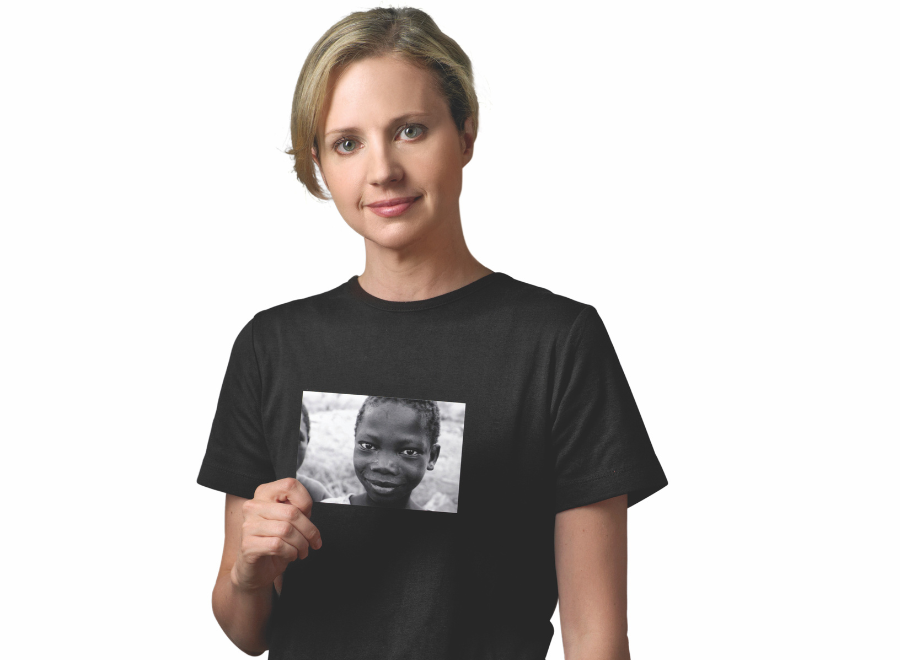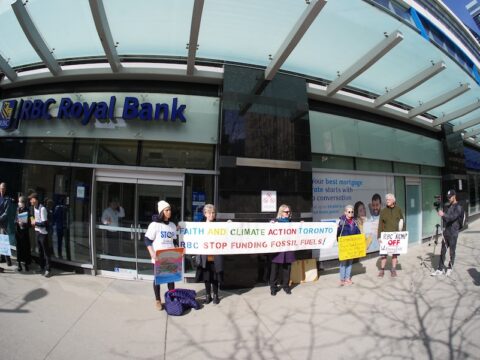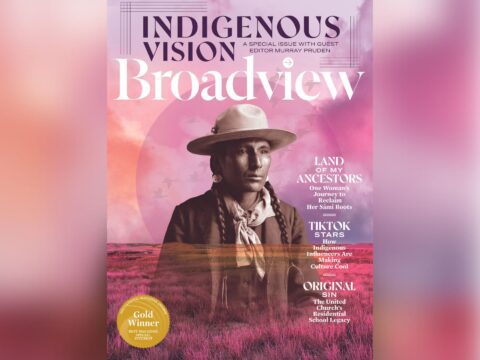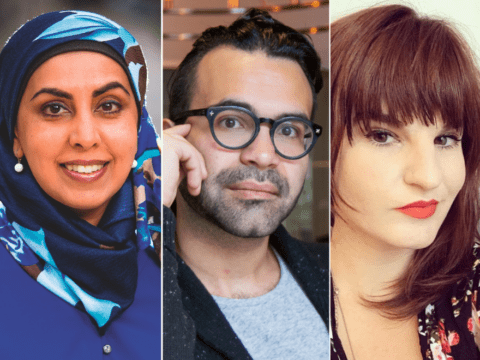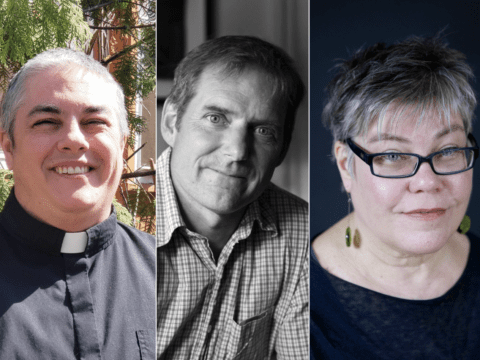Running footsteps. Slamming doors.
It was 2004, and Samantha Nutt was hiding with a small group of hotel visitors and employees in a guest room near the Congolese-Rwandan border. She’d come to the Democratic Republic of Congo to film a documentary about the ongoing impact of previous wars. When militia violence unexpectedly resurged, she and her team found themselves in its path of destruction.
You may unsubscribe from any of our newsletters at any time.
The crashes of mortar shells landing near the hotel grounds were frightening enough, but when Nutt heard someone systematically searching the floor above her hiding spot, her thoughts turned to the inevitable: “There was only one other woman in the room, an American embassy employee,” she writes in her 2011 book, Damned Nations: Greed, Guns, Armies, and Aid. “I knew it wouldn’t be long before she and I would be dragged outside and raped. And what would happen to the men? Some would be mercilessly killed as a statement about who’s really in charge of the eastern Democratic Republic of Congo. Others would be shot so that an itinerant group of pubescent boys might feel the rush of holding absolute power over life and death.”
To everyone’s relief, the intruder turned out to be a volunteer United Nations peacekeeper who had been dispatched to lead civilians to temporary safety at an evacuation camp. But the experience taught Nutt first-hand that “in war, fear is absolute.” It also reinforced her resolve to continue her life’s mission: to help build a world where nobody has to live in that type of fear.
Nutt is a petite 43-year-old Torontonian with strawberry-blond hair and a deceivingly youthful face. She didn’t always expect to become a doctor-activist-humanitarian. “It conjures up images of fearless, resilient characters,” she jokes in Damned Nations, “not bookish, asthmatic, and self-pitying ones.”
Self-deprecating humour aside, she has the right stuff: intelligence, tenacity (“a stubbornness that borders on single-minded lunacy,” as she describes it) and a social conscience rooted in four childhood years in apartheid-era South Africa. Her first experience of social injustice was being admonished by police officers for playing in a “whites only” park with a little girl who was black.
As an undergraduate student in Hamilton, Nutt was active in several on-campus NGOs as well as marches against apartheid. Her interest in the relationship between human rights and health care led her to apply for medical school, an unusual move for someone whose education was primarily in the humanities.
Today, she’s a professor of medicine at the University of Toronto and a practising family doctor at Women’s College Hospital, but her career took on an extra dimension when she was invited in 1995 to take part in a UN tour of war-battered Somalia. Nutt’s role on the trip was assessing how the war affected women’s health needs. At one of her stops, she was threatened at gunpoint after taking a photo to document a drinking-water crisis.
“After I came back, I didn’t think I was going to do that kind of thing again. It was intense,” she says. “But they called me back and asked if I’d go to Burundi, then Iraq, then Liberia. After a certain amount of time, I finally said, ‘Well, I guess this is what I do.’” She pauses before adding with a hint of sadness, “After a while, you’ve lived too much and lost too much not to go back.”
Over the years, the work that began as a way of satisfying intellectual curiosity has turned deeply personal. “Everyone needs to have a ‘why’ for what they do,” Nutt says, “and I know what mine is: whenever I wonder if I have the emotional reserves to keep going or whether I made the right career choice, I quickly get over myself by thinking of the people I’ve known around the world who are brave in ways that I could never be.”
Having found her source of inspiration in other people, Nutt — while happy to team up with faith groups, so long as they’re willing to put the needs of beneficiaries above proselytizing — is first and foremost a humanist. “I find evidence of the power and potential of human beings all around me, in everything I do,” she says.
In particular, she feels motivated by the female activists she’s befriended abroad — some of whom have been killed for speaking out against violence and abuse, corruption, sexism or the lack of safety and opportunity for their children. These activists and the people they advocate for need justice, not pity, says Nutt, who finds fault with what she calls “poverty porn”: a form of NGO advertising that seeks to make donors feel like knights on white horses by portraying beneficiaries as helpless victims. “What we should offer them is common cause and collaboration for long-term structural changes.”
Years of interviewing civilians caught in the crosshairs of war gave Nutt insight into how to collaborate more effectively. Equipped with a backpack and a cellphone, she set off to raise support for an organization that would fill a particular gap she’d noticed: once violence subsides, the transition from immediate relief to long-term recovery is often late — or missing altogether. War Child Canada, founded in 1999, was the eventual fruit of her efforts.
“When war itself ends, the consequences endure,” War Child’s website explains. “A lack of employment opportunities, a destroyed infrastructure, an under-educated population and a culture of impunity around rights violations combine to create conditions that make a return to conflict all too possible.”
Initially, War Child wasn’t an easy sell. Nutt started off with only one team member: her husband, Eric Hoskins, a fellow physician and activist who later moved into politics (he’s currently in the running to replace Dalton McGuinty as leader of the Ontario Liberal Party). She proceeded by asking for support from more or less everyone who crossed her path. “And if I didn’t like the answer, I asked someone else,” she laughs. “It turns out that’s a very effective advocacy strategy.”
After listening to her pitch, one PR executive told Nutt she was wasting her time because the concept of war-affected children wasn’t marketable — Canadians preferred local causes. On the bus ride home from the meeting, Nutt was on the verge of tears. “But then I realized something vitally important,” she says, smiling. “I realized that guy was an a—hole!”
He wasn’t entirely wrong, though: people are more happy to donate money for a natural disaster than a human-made one, Nutt admits, even though 80 percent of those affected by war are innocent: women raped as a way for militants to display hostility and power, children kidnapped and forced into soldiery, civilians cut off from health care and life’s essentials.
Furthermore, ordinary Canadians actually contribute to foreign conflicts, whether they realize it or not. The minerals that run our cellphones and mobile devices, the diamonds we wear, the mining shares in our pension plans and the policies that our government pursues in our name are all examples of our indirect involvement.
Nutt’s big break finally came in the surprising form of the band the Tragically Hip, who threw a benefit concert at the Forks in Winnipeg and raised enough funds to get War Child off the ground. The organization supports community programs such as free legal assistance for women and children who have experienced war atrocities, or vocational training for young people whose education was interrupted by instability. The hope is to break the cycle of violence by helping children grow into “healthy, educated and productive adults” — the kind of adults who won’t easily be manipulated by warmongers seeking power with promises of retribution or glory.
A lineup of oncology nurses stretches around a hallway corner in Ottawa’s downtown Hilton Hotel last October. Nutt sits behind a desk at the line’s head. She wears dark clothing and a smile, looking professional yet approachable. The nurses discuss Nutt in admiring terms; she’s just offered the keynote speech at a conference about effective advocacy in nursing. In a nod to her audience, she’d broken the ice with this crowd-pleaser: “I’m here to tell you what many of you already know: some doctors really are Nutts!”
A pair of middle-aged women from Winchester, Ont., reach the front of the line, and as Nutt signs their copies of her book, one of them shyly offers, “I’ve always wanted to advocate for certain changes, but I guess I’ve never had the courage.”
“It’s not too late to start,” Nutt says, gently but bluntly.
Throughout the morning at the conference, she speaks with casual candour, seemingly unconcerned about watering down her opinions for the sake of diplomacy. And she may be all the more effective for it: the work of an activist, after all, is not to make everyone feel warm and comfortable, but rather to tackle unpleasant truths.
One of her prickly qualms is with “voluntourism,” an umbrella term for overseas excursions that offer opportunities to care for children in orphanages, erect school buildings, dig wells and so on. Without doubting the good intentions of participants, Nutt says that such projects are a waste of thousands of dollars at best, and at worst, a source of harm.
“A revolving door of unskilled workers on the ground in two-week increments is more of a burden than a benefit to any community,” she argues, pointing out that every piece of inexpert work done by an overseas visitor means one less opportunity to provide employment and experience to local young people.
She’s particularly critical of short-term orphanage volunteering, which, she says, risks traumatizing children by leaving them with feelings of repeated abandonment. “Voluntour participants,” she writes, “typically refer to the ‘deep bonds’ they formed with children and how meaningful the experience was, without realizing that therein lies the problem.”
Nutt worries that the level of “development literacy” in Canada is low, and as a result, people and organizations channel their goodwill in the wrong directions. Schools should be teaching some basics, she argues, in order to dispel antiquated notions of charity and replace them with information about what actually seems to work and what doesn’t. Until then, she feels compelled to travel around the country giving talks on the subject.
Once the crowd of nurses disperses, I sit down with Nutt on a sofa in the hotel’s lobby. It’s a busy, noisy spot with suited men and women milling around — not ideal for an interview. But Nutt doesn’t seem to notice; maybe she’s used to a certain amount of chaos. The question on my mind is, “Where does your hope come from?”
“Hope is such a clichéd word,” she jokes. “I blame Obama. But seriously, my hope is based on experience, evidence . . . and sheer will.”
She admits that doubts about whether our humanitarian efforts are really accomplishing anything at all have bothered her ever since she first visited a war zone at age 25. “You can feel so cynical about your capacity against these big, entrenched problems. When it comes to advocacy, we’re often too paralyzed to try.”
But even in the worst quandaries, there’s reason to believe in the potential for improvement. She provides an example: “Eight or nine years after implementing catch-up education programs, when you see young people who are providing for themselves and their families and going to school to become doctors and lawyers, and when you know that years ago they felt there was nothing for them and were angry and resentful, it undermines your cynicism. It makes you think, ‘Who am I to say this isn’t worth it?’”
Nutt will be in Ottawa overnight to give another talk in the morning. But for now, she retires to her guest room to answer e-mails, polish up what she will say tomorrow and perhaps work on the outline for her next book, a treatise on the unfinished global work of feminism. (“I suck at writing outlines; it would be easier to simply write the book,” she says.)
Her longer-term goals include “staying alive,” starting up an American division of War Child, raising her seven-year-old son, Rhys (whom she calls “the best part of my life”), encouraging people to think critically and battling injustices. “As long as I’m doing that in whatever form,” she says, “then I’ll feel satisfied.”
***
This story first appeared in The United Church Observer’s January 2013 issue with the title “Change maker.”

